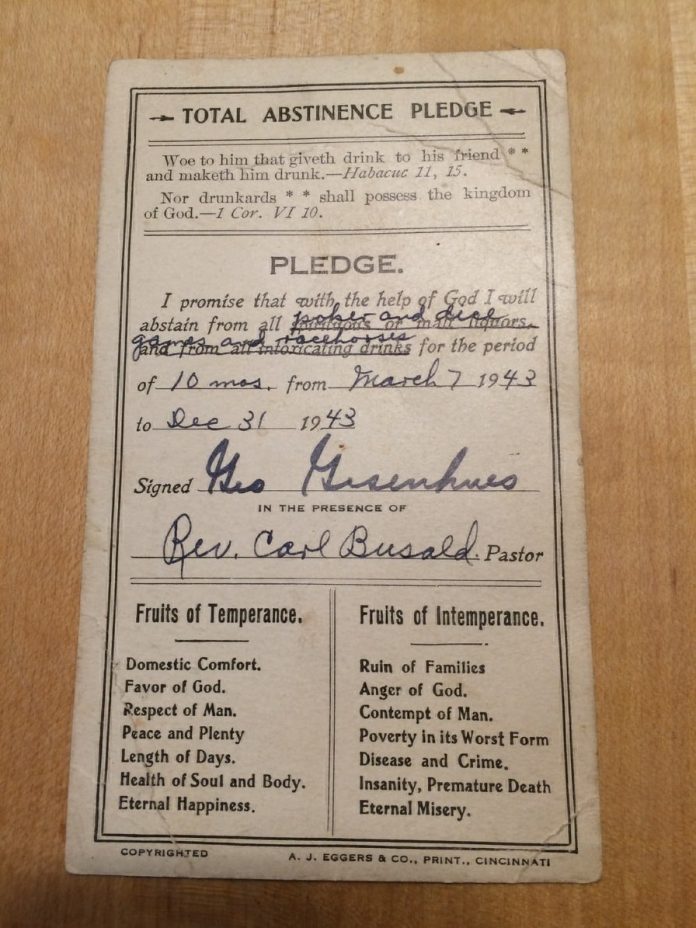By Amy Gesenhues
As of tomorrow, I will have known my husband exactly 20 years, 19 of which we’ve spent married.
I thought it was so romantic, the two of us barely old enough to file taxes, marrying exactly one-year from the day we met.
Now, I know the most romantic thing about us is that we’ve stayed married. (So far.)
Last weekend, we found ourselves yelling at each at the edge of our backyard. I walked out to ask when he was going to be finished. The weed-eater he was holding was still running. He had on plastic, see-through goggles and the noise canceling earphones he wears when he mows were around his neck.
“When I’m done,” he yelled to me over the buzz of the weed-eater.
I gave him that look. My head slightly tilted, my hands on my hips, an eye-roll then a stare.
“You’ve been out here three hours.”
I wanted to play tennis later that day and was trying to determine if I needed to feed the kids before I left, or if he could take over dinner duty.
From there the conversation went from zero to 60 in about five seconds – 60 being his utter frustration over my lack of interest in the state of our landscape.
“I’ve been out here all day, and still need to weed the front, and you’re complaining because you want to go play tennis.”
Writing it all down now, I see he had a valid point.
My husband is most fulfilled with a job well-done. He’s a big proponent of prep work, and likes to start his day by listing all the things he plans on accomplishing.
I like to play. The last thing I want to hear first thing in the morning is a list of things I have to do. I have no regrets spending a day drinking coffee, reading, staying in my robe until noon.
My grandparents were married more than a half century before us in 1940. George and Marietta Gesenhues were both Catholic, both raised on farms in small Southern Indiana towns just north of the Ohio River.
This is how Grandma describes our grandfather in her autobiography:
“George was very different from my father. My father was a shy man, more like me. And George was a person who liked a lot of people around. My father did almost nothing but work. And while George was a good worker, he also liked to play. My father was even-tempered. George could get irritated very quickly. My father was close with money. George was generous.”
They were married nearly 30 years before they divorced – still a decade longer than I have been married. My grandmother wrote about the end of her marriage, and how she found out her husband was having an affair from a woman in her Homemaker’s Club.
“I don’t know how you put up with George,” said the woman, “He’s been seeing another woman for I don’t know how long.”
Grandma says she felt as if she had been struck in the head.
The chapter that digs into her marriage, and the unraveling of it, is titled 1945 – 1975. It is a gut-wrenching read – and just as heartbreaking as the following chapter titled May 14, 1977. (The day my father drowned.)
She writes about my grandfather’s compulsive gambling – without using the word compulsive. How his trips to the track became more and more frequent, while their bank account continued to shrink.
Part of me, the part that likes to play, wants to write about how my grandfather loved to gamble. The more honest part of me, the part that has sat through too many therapy sessions to count – the part that has spent the last eight years sober, knows my grandfather was addicted to gambling.
Just last week, my cousin unearthed a document signed by our Grandfather in 1943. It’s an Abstinence Pledge, but the language about refraining from “intoxicating drink” has been marked out. Instead, Grandpa signed the document, promising, with the help of God, to abstain from all “poker and dice games and racehorses” for the period of ten months.
The ten-month time period listed on the document – which is also signed by the pastor who married my grandparents – coincides with my Grandmother’s first pregnancy.
Nine years ago, during a Christmas party with work colleagues, I drank enough that I couldn’t walk straight. Hours before the party had ended, before it had even moved to a second location, I stumbled and fell into a table, knocking over drinks into the laps of my boss, my colleagues, and their spouses.
The next day, my husband told me, “Our daughter is not being raised by an alcoholic.”
I stopped drinking for three months shortly after that night – and then for good the following year.
I never signed an Abstinence Pledge. I keep staring at the one my Grandfather signed and thinking about how my grandmother described him, how he liked to play.
My Grandfather died nine years after his divorce. He was working on a car, underneath it, when it rolled off the jack and killed him instantly. I was six. My memories of him are slight. In my mind, he is larger than life. I remember him bringing my mom and I a box of fresh peaches.
I think about how I struggled with drinking, and then with not drinking. How getting a buzz was fun, until it wasn’t.
What is it that is stamped into my DNA that so easily turns things from play into addiction? The genetics that turn a night of cocktails with work colleagues into the near downfall of a marriage – that turned dice games into divorce.
How far back does it go? And, can it be broken? Are we all already cooked before we’re born? I sit here at my dining room table, watching my children, and wonder how far it will reach into their future.

Get ready to connect to your joy, manifest the life of your dreams, and tell the truth about who you are. This program is an excavation of the self, a deep and fun journey into questions such as: If I wasn’t afraid, what would I do? Who would I be if no one told me who I was?
Jennifer Pastiloff, creator of Manifestation Yoga and author of the forthcoming Girl Power: You Are Enough, invites you beyond your comfort zone to explore what it means to be creative, human, and free—through writing, asana, and maybe a dance party or two! Jennifer’s focus is less on yoga postures and more on diving into life in all its unpredictable, messy beauty.
Note Bring a journal, an open heart, and a sense of humor. Click the photo to sign up.


[…] Much to my delight, what started as a blog post here ended up being published on one of my favorite literary sites. You can read the rest of my essay at: The Manifest Station. […]
We all have pre-dispositions in our DNA but we don’t all fall into the trap that our DNA has set for us. Alcoholism runs on my father’s side of the family, my paternal grandmother’s side to be exact, and my mother’s side is no better. I’ve had my run-in with some alcoholism in my early twenties but when I got pregnant, I stopped cold turkey. I never got addicted though. Now, I have a glass of wine a couple nights a week with dinner and can drink socially without any sort of threat. Maybe I just got really lucky, I don’t know.
I love your post and I can relate. Thank you.